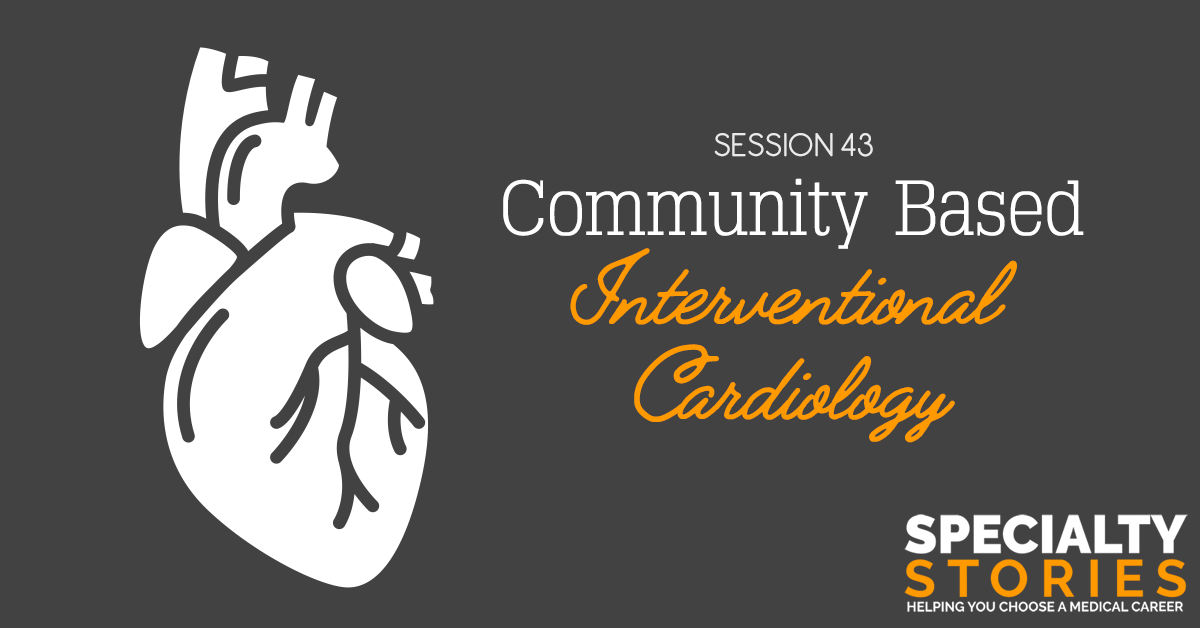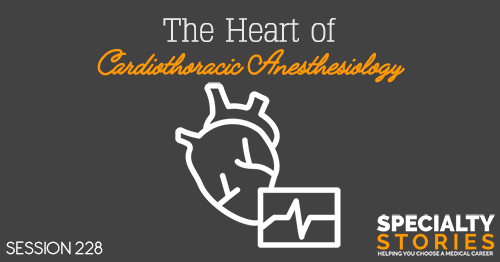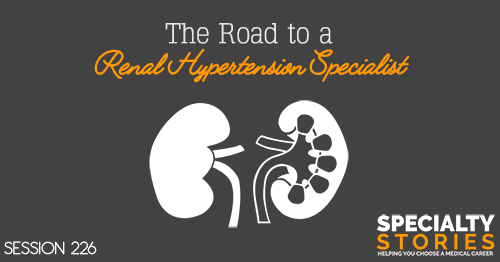Apple Podcasts | Google Podcasts

Session 43
Dr. Venkat Gangadharan is a community based Interventional Cardiologist. We discuss his interests in cardiology and his thoughts about the specialty. He also gives his opinions on the latest changes in our healthcare system regarding reimbursement cuts as well as turf wars between specialties.
Also, check out all our other podcasts on the MedEd Media Network, including The Premed Years Podcast, The MCAT Podcast, The OldPreMeds Podcast, and The Short Coat Podcast.
[01:08] Interest in Cardiology
Knowing he wanted to be a cardiologist right on his second year of medical school, Venkat did what he could to figure out. By the time got into residency, his mind changed and considered things like pulmonary critical care or cardiology. Then he got the chance what the cath lab was like and got to see what they do when they treat heart attacks. And he got sold right then.
He’s the type of guys that likes instant gratification in terms of treating patients. He wants to see them get better right then and there. So he found doing cardiology and interventional cardiology was the way to go. He knew he wanted to do interventional cardiology by his second year of cardiology fellowship. He recalls applying everywhere across the U.S. He thinks it was the toughest thing being one of the several thousands trying to get the same position. He has interviewed in at least ten different places. It was so difficult for him that he finally ended up matching in a program at the last minute. He decided to take it and to him it was the greatest decision ever.
[Tweet “”No matter how competitive you are, you’re one among several thousands that are trying to get the same position.” https://medicalschoolhq.net/ss-43-community-based-interventional-cardiology/”]
What he really likes about cardiology is the physiology behind it. Plus, it required some amount of critical thinking and problem solving. But at the end of the day, there were define medications for certain purposes. There are risk factors you know you could treat. And the problems had definitive treatment modality and cure to some extent. Basically, he’s fascinated by how the heart works.
[04:40] Traits that Lead to Becoming a Good Interventional Cardiologist
Venkat cites some traits in order for one to become a good interventional cardiologist such as being dedicated and hardworking. You need to be analytical and be able to think on your feet. In the cath lab and you have a patient’s life in your hands, there are probably a million different decisions running through your head.
With so many things running through your head, you just have to choose the right one and make sure the patient gets through it no matter what. With heart attacks, for example, the chance of people dying from it is so low nowadays. Everybody has got a chance. Compared to back in the days during the infancy stage of interventional cardiology, there were no facilities to treat people. There was no place to send them.
[Tweet ““With the technology we have, there’s not one person in the country that should not have the chance to live at the hands of a cardiologist.” https://medicalschoolhq.net/ss-43-community-based-interventional-cardiology/”]
That said, you have to be able to think outside the box. You have to be analytical and mechanical. Venkat explains that interventional cardiology is all about physics and the give and go.
Additionally, having that adrenaline junkie kind of mentality is an edge. When you’re taking an emergency call, you will have to wake up in the middle of the night to have of your faculties all ready to go. Drive to the hospital. Then have all of your fingers ready to go to and adept to put a stent or fix a blood vessel to fix a person’s life. You need to love the rush for you to be able to mental faculties to take care of that problem in the wee hours of the night.
[07:22] Private Practice versus Academic Setting
Venkat explains the reason he chose private practice was being the easiest choice at that time. There are far more private practice physicians at that time than there are academic positions. Second, you have to have a certain mentality and persona to be an academic interventional cardiologist compared to a private practice physician.
[Tweet “”I wouldn’t say it’s money driven per se, but I would say it plays a huge role in the decisions you make when it comes to the job you pick.” https://medicalschoolhq.net/ss-43-community-based-interventional-cardiology/”]
As a private practice physician, you have the ability to dictate your own life as well as the ability to treat your own patients. You have the ability to learn things at your own speed without having to answer to anyone else but your own practice. These were what Venkat was looking for.
[09:07] Types of Patients and Typical Day in His Life
As an interventional cardiologist, Venkat sees everything from valvular heart disease to atherosclerotic vascular diseases. It’s truly mind boggling that the amount of coronary disease that is out there and how young a person can be by the time they get affected. Venkat finds it humbling to be doing intervention in a 34-year-old when you’re the same age as he is and living the same kind of life he is. For him, this is eye-opening and it makes you realize how life is short and you need to take good care of yourself. So when he things sees on the screen, it makes him think twice. It’s surprising to see how bad people’s arteries could be at such a young age.
As a private practice physician, Venkat says it’s tough being just an interventional cardiologist. So he also practices a lot of general cardiology and interventional cardiology, But his mind is always focused on what he can do to fix something.
He gets to the hospital around 6 or 6:30 in the morning and do some rounds. If anyone comes in with a heart attack or he’s on call, he drops whatever he’s doing and go and save that life. Then he goes to the office or clinic and trying to recruit patients to your practice so you can maintain a lifestyle and a career.
[Tweet “”It’s very rare in private practice to find a position where you just do interventional cardiology.” https://medicalschoolhq.net/ss-43-community-based-interventional-cardiology/”]
You have to be ready to handle any situation presented to you. Venkat takes emergency calls about three to four times a week. Being a young doctor, his practice is made up of only two interventional cardiologists. He usually gets a call about three times a week. But not all private practice is like this. The larger the private practice, the less call that you’re going to take.
From a general cardiology perspective, he takes calls once a week and he does one week in the month. Initially, when he started out, it was pretty rough not realizing it was this much work. But Venkat explains that you will get used to it.
[12:21] Work-Life Balance
Venkat thinks having that work life balance is a million dollar question. Over the past three years, he had thought about what life was like outside of his work and the balance he had between work and his home life. He has a two-year-old son who misses him all day long. There are plenty of days he’d feel bad about coming home late or working as much as he does. But at the end of the day, being a young physician and knowing this is your career, this is the time to make a living. This is the time to earn for your family. After which, you can decide what’s going to work for you and where you want to spend your time more.
[13:33] The Path to Interventional Cardiology Residency and Fellowship Training
Once out of medical school, you decide to make an internal medicine residency. When he was applying, he looked for decent cardiology fellowship knowing it was what he was going to do. The likelihood of you getting into the cardiology fellowship at the residency program you trained at is better than one than you’d get at another place.
This is followed by another three years of cardiology fellowship. At this time, you’re introduced to cardiac catheterization and different aspects of interventional cardiology. Also around the second year, you also make the decision if you want to become one and start applying to interventional cardiology fellowships.
The difference between interventional cardiology fellowship applications and the general cardiology fellowship applications is that many of those programs are paper applications. This means you have to seek them out. Find out what their application process is. Do every step you can and apply. Then follow up several times if they’ve received your application.
[Tweet “”Try to hone in on the programs that you really want to be a part of.” https://medicalschoolhq.net/ss-43-community-based-interventional-cardiology/”]
Things they would usually look at are your degrees of research you’ve done during fellowship, your progress in testing during fellowship and training, and where you trained which goes a long way.
As to why he thinks matching into interventional cardiology is so competitive, Venkat believes it’s one of the more rewarding cardiology fellowships. The number one killer of people in the world is heart attacks. And interventional cardiology is essentially designed to treat those. So the amount of people applying to be an interventional cardiologist are far more than the people applying to be an electrophysiologist or a nuclear cardiologist. And for electrophysiology in particular, the testing is very difficult. It requires someone to be very cerebral and a mentalist to handle that kind of profession.
[16:18] Bias towards DOs, Subspecialty Opportunities, and Turf Wars
Venkat actually has not seen any bias towards DOs. In his own practice, he has a partner who is a DO. He took a very long way to become what he is today. But he’s a successful interventional cardiologist.
[Tweet “”At the end of the day, the MD and the DO designation is just a designation. The person you are is the physician that you are.” https://medicalschoolhq.net/ss-43-community-based-interventional-cardiology/”]
Venkat adds that you can be an MD and be an awesome physician. You can be a DO, and still be an awesome physician. He really doesn’t think this has any weight in terms of whether you have a chance of being an interventional cardiologist or not. It’s about what you do with the time you spend and the training you spend that makes who you are.
In terms of subspecialty opportunities after interventional cardiology, Venkat explains there is a new development in structural heart disease. In the country, there’s only a handful of programs that are accredited structural heart disease fellowships. The ACC and the AVIM have yet to recognize a designated fellowship for this.
Coronary heart disease is not the only thing that plagues people, Peripheral vascular disease is also what plagues people. So there are specialized fellowships to do a training in endovascular work. Venkat explains that as interventional cardiologists, they’re actually an interventional cardiovascular physician. So the vascular aspect of things is largely untapped and majority of that training can be obtained after a fellowship.
Venkat also admits having turf wars brewing between cardiovascular and vascular surgery. When it comes to peripheral vascular disease, it’s a turf war between a vascular surgeon, an interventional cardiologist, and an interventional radiologist. He adds there are programs out there with long, trusted interventional radiologist to do the procedure or long, trusted vascular surgeon to do the procedure. As interventional cardiologists, they are making the push to take that on themselves.
[Tweet “”The breadth of peripheral vascular disease is so poignant in this country. There’s opportunities everywhere.” https://medicalschoolhq.net/ss-43-community-based-interventional-cardiology/”]
But Venkat says that you won’t see many private practice interventional radiologist or private practice vascular surgeons doing a lot of endovascular work. Majority of them have some sort of academic affiliation. You will see a lot of private practice interventional cardiologist doing all of that work.
[20:10] Working with Primary Care and Other Specialities
Venkat wished primary care physicians knew the breadth of disease they see and the complicated nature of disease present in their patients. He really wished they would understand the medications they use to treat these conditions. Unfortunately, Venkat lives in a place where managed care is a strong push in the area. By this. primary care physicians are limited in the medications they can offer their patients. Many of them end up changing the medication he places his patients on. Or they deny the stress test or deny the arterial ultrasound the patient needs to gather some more information for their complaints. It actually blew his mind when he first got there. But that was the reality. And in the three years there now, he still couldn’t grasp the idea where primary care physicians are literally dictate a patient’s life regardless of the symptoms the have.
[Tweet “”I still couldn’t grasp this idea where primary care physicians are literally dictate a patient’s life regardless of the symptoms the have.” https://medicalschoolhq.net/ss-43-community-based-interventional-cardiology/”]
Venkat describes it’s like the patient has to show up in the hospital to get the real care they deserve. They go to their primary care physician because six times out of ten, they’re going to get denied. This is saddening. Venkat says he had to rescue people at death’s door when they could have been rescued two years earlier.
Other specialties he works the closest with include pulmonary and critical care, infectious disease, and nephrology.
[23:28] Special Opportunities Outside Clinical Medicine
Venkat explains that the more senior you become as an interventional cardiologist or cardiologist even, the opportunities outside of medicine start to open up. When you’re a part of a large hospital system and you have a good relationship with the hospital administration, most of those avenues are open for you.
One of his partners is the chief of internal medicine in the hospital as well as the chief of cardiology at the hospital. It’s a rotating door when it comes to that position.
[Tweet “”Cardiologists are often taken in high regard because we have our fingers in every aspect of things.” https://medicalschoolhq.net/ss-43-community-based-interventional-cardiology/”]
Other cardiologists have also migrated to other industries. His mentor has left interventional cardiology practice of 45 years and is now engulfed in an industry that promotes one of the products he helped design and bring to market. So you have the opportunity to migrate over to an industry and be a speaker and teach the world about what you do.
[24:55] What He Wished He Knew and What He Likes the Most and Least
Now knowing what the process is like to get better framed in what he does, he wished he probably should have sought out an extra fellowship at the end of his one year of interventional cardiology. Had he known the amount of opportunities out there, he probably would have given it a better shot.
Secondly, although a private practice physician, he wished he had given academic interventional cardiology a strong push at the time he was making the decision for a job. He never knew it was this busy. But he’s a young guy so he’s pushing through it.
What he likes the most about being an interventional cardiologist is doing procedures. He loves working with his hands. He loves the adrenaline rush of fixing a heart attack. For him, waking up at 2 am is not difficult. If he could save a life and they’d walk out the door the next day, alive, he feels he has done his job for the day.
[Tweet “”To me, the procedural aspect of this whole profession is what makes the best thing everyday.” https://medicalschoolhq.net/ss-43-community-based-interventional-cardiology/”]
What he likes the least, on the other hand, is the bureaucratic aspect of it. Running a private practice or trying to develop a career as a private practice physician is very difficult. Unless you have the business know-how or the business acumen, it’s difficult to make yourself well-known in the community that has several people just like you. But it does teach you what the business of medicine is like.
[Tweet “”One of the things we lack as residents and fellows is that nobody ever told you what the business of medicine is like.” https://medicalschoolhq.net/ss-43-community-based-interventional-cardiology/”]
Reality is that everything costs money. Everything you do, you need to earn something from it. And you need to be happy doing what you do in a day in and day out basis. So you need to find a place that gives you the opportunity to grow as a physician. But it should also give you the security that you know this job is going to keep you happy for years to come.
[28:00] Major Changes Coming in the Field
One of the major changes that is likely coming over the next year or two is that CMS is bundling payments when it comes to cardiac procedures and cardiac diagnosis. For instance, myocardial infarction which used to be differentiated in terms of medications and procedures are now going to be bundled under one big heading called myocardial infarction. So the payment you’re going to get is going to be far less than what you’ve gotten in the past.
Over the last five years, Venkat explains how the field has been largely affected by the reimbursement and the cut in reimbursement. They’ve lost almost 40%-50% of what the normal reimbursement would be for a regular procedure. So it’s not becoming more cutthroat in their field to do more work, find more patients, and treat more disease since you’re not making as much as you used to.
This is going to get worse as time goes on, Venkat suspects. Eventually, private practice is likely going to dissipate depending on where you live and hospital-employed physicians and hospital-employed practices are going to predominate in this country. The reason for this is because hospitals are able to negotiate their deals with insurance companies and pharmaceutical companies than a private practice will. So if you want to make a decent living, you might end up becoming a hospital-employed physician.As for Venkat, he’s holding up for as long as he could but he’s aware that it’s just around the corner.
[Tweet “”Hospital-employed physicians and hospital-employed practices are going to predominate in this country.” https://medicalschoolhq.net/ss-43-community-based-interventional-cardiology/”]
[30:40] Reduction in Reimbursements
CMS stands for Center for Medicare and Medicaid Services. Venkat personally thinks it doesn’t make sense to reduce the reimbursement. At the end of the day, these procedures are being done by physicians who are taking the time out of their night to stay awake in order to save a person’s life. The procedures continue to stay arduous. They don’t get any easier. Although there’s technology available to treat these conditions, these procedures don’t happen in 30 minutes. It takes an hour or as long as four hours. So the work, stress, and the difficulty of your general lifestyle continue to exist and never change. Hence, reducing the reimbursement for these procedures is fostering an idea that medical management is better than risking your own life trying to do something.
Venkat has seen a lot of his partners who were interventional cardiologists 30 years back when things were great. It changed the way they practice based on the reimbursement they’re getting. He raises this question that, “why would you go and try to do something whether to save a person’s life or to be good at what you do, when the government and insurance companies don’t feel like it’s necessary and don’t feel like you should get paid for it?”
Venkat thinks this kind of mentality is coming out a lot in newer graduates. The older generation is also catching up to it and realizing they can’t make as much as they used to. So it’s throwing a big stress in many of these private practice groups.
[Tweet “”The idea of newer graduates to think that they’re going to get paid like they did 30 years ago, it’s never going to happen.” https://medicalschoolhq.net/ss-43-community-based-interventional-cardiology/”]
Venkat’s advice to the younger generation is that if you want to be an interventional cardiologist, you’re doing it because you love what you do. Don’t do it for the money because it’s happening everywhere.
[33:22] Final Words of Wisdom
If he had to do it all over again, Venkat admits he would still have chosen interventional cardiology – 120%.
For students thinking about becoming an interventional cardiologist, Venkat explains that cardiology is a specialty that is going to continue to grow. It will continue to become the most prevalent disease in this entire world. If your heart is in cardiology and you truly believe that you want to help people and the adrenaline rush is what you live for, interventional cardiology is the way to go. You’re going to love working with your hands. You’re going to love the equipment they use. And it’s only getting better. You can do things with heart arteries that people couldn’t even fathom 30 years ago. The things your’e going to be doing is just unimaginable. Research keeps happening and happening. So if you love cardiology and you love what you do and you live for excitement, you’re not going to be disappointed.
[35:02] Last Thoughts
Venkat is the first cardiologist on this podcast. I hope to bring you many other subspecialties within cardiology so you can get a great picture of what cardiology looks like for you, possibly in the future. Our goal is to find all these different specialties and talk to them and find out what their job is like. So as you’re going through your training, you get a better picture of what life for you will look like. You will hear what physicians like about their specialties and what they don’t like about it. This will help guide you on your journey to choosing your specialty.
Links:
SEARCH SITE
LISTEN FOR FREE











